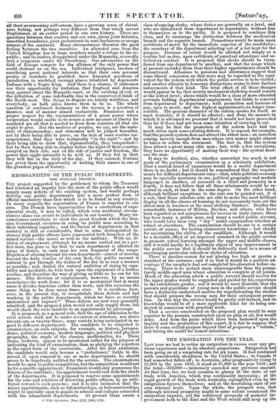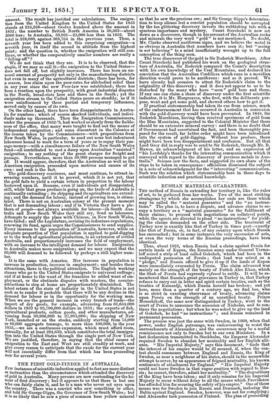THE EMIGRATION FOR THE YEAR.
LAST year we had to notice an emigration in excess over any pre- vious experience and in its absolute proportions. Emigration had been going on at a surprising rate for six years. It had continued with considerable steadiness to the United States ; to Canada it had somewhat fallen off; to Australia, after progressively rising to 21,000 in the year 1851, it stood at 87,000 in the year 1852 ; and the total-368,000 —immensely exceeded any previous amount. At that time, too, we took occasion to glance at the state of our trade with America, which was continually increasing ; at the rapid growth of the trade with Australia, exemplified even by the emigration-figures themselves; and at the flourishing state of our own internal trade. Upon the whole, the prospect was, that although internal prosperity might to some extent counteract the emigration impulse, yet the continued prospects of material im- provement both to the East and the West would still keep up the amount. The result has justified our calculations. The emigra- tion from the United Kingdom to the United States for 1853 stands at 225,258—about twelve hundred above the amount in 1852; the number to British North America is 30,563—about 3000 less ; to Australia, 59,931-25,000 less than in 1852. The total is 318,680, against 368,764 in the previous year. Thus, a seventh year has been added to this surprising emigration—a seventh year, in itself the second in altitude from the highest point; and the question is, whether the emigration will still con- tinue, or whether the comparatively smaller numbers are really a " falling-off" ? We do not think that they are. It is to be observed, that the staple, if we may so call it—the emigration to the United States— does not fall off, but slightly increases. There has been an un- usual amount of prosperity not only in the manufacturing districts but even in many of the agricultural districts ; there has been, for a season, less claim upon the poor-rates for ablebodied relief than in any year since the new Poor-law was established ; there has been a reaction upon the prosperity, with great industrial disputes in the North, bread-riots here and there in the South ; yet the emigration stream to the United States pours on steadily, as if it were uninfluenced by these partial and temporary influences, moved only by causes of its own.
On the other hand, there have been disappointments in Austra- lia for numbers ; which of course abecked individuals, and indivi- duals make up thousands. Then the Emigration Commissioners, under the pressure of 1852-'3, had worked so slowly from the feeble- ness of the office, that many were taught to find out the means of independent emigration ; and some discontent in the Colonies at the course taken by, the Commissioners—with propositions from New South Wales, in particular, to send out none but indentured labourers bound to work for a term of years or to repay their pas- sage-money—with a simultaneous failure of the New South Wales fund—all contributed to cast a damp upon Australian " assisted " emigration; to say nothing of the great charges for freight and passage. Nevertheless, more than 59,900 persons managed to get off. It would appear, therefore, that the Australian as well as the American emigration proceeded upon motives and causes of its own : and such is the fact.
The gold-discovery continues, and must continue, to attract in- ereasing numbers, until it be proved, which it is not yet, that the gold fails to yield a certain return in proportion to the labour bestowed upon it. Becank, even if individuals get disappointed, still, while that gross produce is going on, the trade of Australia is continually extending ; its shipping and its agriculture are extend- ing; and the demand for labour, instead of growing less, is stimu- lated. There is not an Australian colony at the present moment that is not demanding labour; and if in Victoria they have a ple- thora of people—not always available for labour—in South Aus- tralia and New South Wales they still cry, Send us labourers. Attempts to supply the place with Chinese, in New South Wales, have failed ; and the Legislature, revising its indenture-regulations, renewing its fund, again urges the CRiamissioners to send supplies. Every increase to the population ofrAustralia, however, while an adequate proportion of that population is applied to gold-digging or to the work of agricultural production, is an extension of settled Australia, and proportionately increases the field of employment, with an increase to the intelligent demand for labour. Emigration to Australia makes more emigration; and we may expect that the 60,000 will demand to be followed by perhaps a still higher num- ber.
It is the same with America. Her increase in population is increase in production, increase in employment; and besides these attractions, there is the political attraction. The English working classes who go to the United States emigrate to universal suffrage ; and if at home to the want of the franchise be added want of em- ployment, or the obstinate disputes with masters, the counter- attractions to stop at home are proportionately diminished. The latest return of the state of industry in the United States is not such as to render it probable that there will be any decline in the demand for labour or in the opportunity for the working man. When we see the general increase in every branch of trade—the import of dry goods, for example, advancing from 61,654,000 dollars in 1852 to 93,700,000 dollars in 1853 ; the exports of fish, agricultural products, cotton goods, and other manufactures, ad- vancing from 30,986,000 to 37,983,000; the shipping of New York, launched or on the stocks, suddenly starting from 75,000 or 80,000 aggregate tonnage, to more than 100,000, in the year 1853,—we see a continuous expansion, which must afford room, annually, for at least 284,639, which constitutes the total immigra- tion into the United States through the single port of New York. We are justified, therefore, in saying that the chief causes of emigration to the East and West are still steadily at work, and give every reason to anticipate that the exode for the current year Will not essentially differ from that which has been proceeding now for several years.



































 Previous page
Previous page